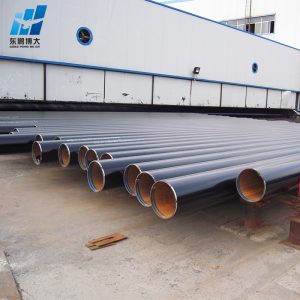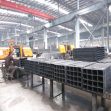China’s environmental initiatives affected the global steel trade
China’s environmental initiatives have had a significant impact on the global steel trade, reshaping market dynamics and influencing key players in the industry. Over the past decade, China has implemented various measures aimed at curbing pollution and reducing carbon emissions, leading to a transformation in the steel pipe manufacturer and its global implications.

One of the primary initiatives that has shaped the steel trade is China’s push for stricter environmental regulations. Faced with severe air pollution and environmental degradation, the Chinese government implemented stringent policies to address these issues. These regulations targeted steel production, a major source of pollution, leading to the closure of numerous outdated and inefficient steel mills. As a result, China’s production capacity of rectangular hollow section was significantly reduced, leading to a decline in its steel exports.
The reduction in Chinese steel exports created a void in the global market, which other steel-producing countries sought to fill. This shift in market dynamics presented opportunities for steel exporters from other nations to expand their market share. Countries such as India, Japan, South Korea, and European nations saw increased demand for their steel products like mild steel tube as they stepped in to fill the gap left by China. Consequently, the global steel trade experienced a redistribution of market power and increased competition among steel-producing nations.
Furthermore, China’s environmental initiatives also prompted the country to upgrade its steel industry and adopt cleaner and more sustainable production methods. This shift towards greener practices, including the use of more efficient technologies and stricter emission controls, improved China’s steel quality and environmental performance. As a result, Chinese steel became more competitive in terms of meeting international environmental standards. This transformation not only affected the global steel market but also influenced the perception of Chinese steel as a reliable and environmentally conscious choice for buyers worldwide.
Additionally, China’s environmental initiatives have influenced global steel prices. The reduction in Chinese steel production capacity, coupled with increased domestic demand for steel due to infrastructure and construction projects, led to a surge in steel prices within China. Higher steel prices in the domestic market created an incentive for Chinese steel producers to focus on supplying the domestic demand rather than exporting. Consequently, steel prices in the global market experienced fluctuations, impacting the competitiveness and profitability of steel trade for various stakeholders.
In response to China’s environmental initiatives and changing market dynamics, steel-consuming industries and countries have also adjusted their strategies. Some industries, such as construction and manufacturing of black iron steel pipe, have sought alternative materials or modified their steel usage to adapt to price fluctuations and ensure a stable supply chain. Moreover, countries heavily reliant on steel imports have diversified their sources and established trade relationships with other steel-producing nations, reducing their dependency on Chinese steel.
Tel: +86 18202256900 Email: steel@fwssteel.com










